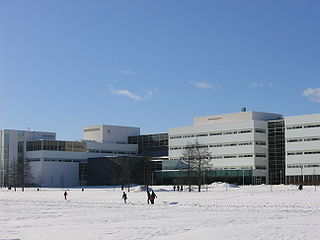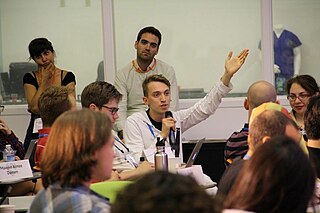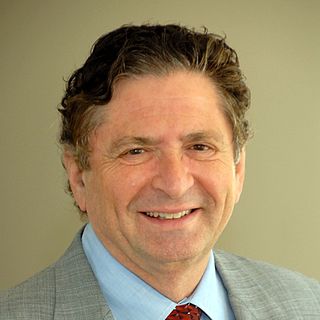Science and technology in Israel is one of the country's most developed sectors. Israel spent 4.3% of its gross domestic product (GDP) on civil research and development in 2015, the highest ratio in the world. In 2019, Israel was ranked the world's fifth most innovative country by the Bloomberg Innovation Index. It ranks thirteenth in the world for scientific output as measured by the number of scientific publications per million citizens. In 2014, Israel's share of scientific articles published worldwide (0.9%) was nine times higher than its share of the global population (0.1%).

Robert Samuel Langer Jr. FREng is an American biotechnologist, businessman, chemical engineer, chemist, and inventor. He is one of the nine Institute Professors at the Massachusetts Institute of Technology.

The Korea Institute of Science and Technology is a multi-disciplinary research institute located in Seoul, South Korea. Founded in 1966, it was the first multi-disciplinary scientific research institute in Korea and has contributed significantly to the economic development of the country, particularly during the years of accelerated growth in the 1970s and 1980s. It has a research staff of over 1,800 research scientists, visiting scientists, fellows and trainees, and foreign scientists involved in basic research in various fields of science and technology.
The pharmaceutical industry in India was valued at an estimated US$42 billion in 2021 and is estimated to reach $130 billion by 2030. India is the world's largest provider of generic medicines by volume, with a 20% share of total global pharmaceutical exports. It is also the largest vaccine supplier in the world by volume, accounting for more than 60% of all vaccines manufactured in the world. Indian pharmaceutical products are exported to various regulated markets including the US, UK, European Union and Canada.

Genome Valley is an Indian high-technology business district spread across 2,000-acre (8.1 km2)/(3.1 sq mi) in Hyderabad, India. It is located across the suburbs, Turakapally, Shamirpet, Medchal, Uppal, Patancheru, Jeedimetla, Gachibowli and Keesara. The Genome Valley has developed as a cluster for Biomedical research, training and manufacturing. Genome Valley is now into its Phase III, which is about 11 kms from the Phase I and II with the total area approximately 2,000-acre (8.1 km2).
The Industrial Technology Research Institute is a technology research and development institution in Taiwan. It was founded in 1973 and is headquartered in Hsinchu City, Taiwan, with branch offices in the U.S., Europe, and Japan.

Innovation Quarter in Winston-Salem, North Carolina, formerly Wake Forest Innovation Quarter, is an innovation district focused on research, business, and education in biomedical science, information technology, digital media, clinical services, and advanced materials. The Innovation Quarter, operated by Wake Forest Baptist Medical Center, is home to academic groups, private companies and other organizations located on 330 acres in downtown Winston-Salem. Its tenants include departments from five academic institutions—Wake Forest School of Medicine, Wake Forest University, Forsyth Technical Community College, Winston-Salem State University, UNC School of the Arts— as well as private businesses and other organizations. One tenant is the Wake Forest Institute for Regenerative Medicine (WFIRM), which is working to engineer more than 30 different replacement tissues and organs and to develop healing cell therapies. The science and research conducted at WFIRM is behind two start-up companies at Innovation Quarter. The ability of researchers and scientists to work alongside entrepreneurs furthers a goal of Innovation Quarter to develop new treatments and cures for disease and advances in technology.

The Agora Center is a separate institute at the University of Jyväskylä in Central Finland. By its nature, the Agora Center is interdisciplinary and networked. Its purpose is to conduct, coordinate, and administrate top-level research and development that relates to the knowledge society and which places emphasis on the human perspective. The research and development is conducted in the form of fixed-period projects in cooperation with the University of Jyväskylä’s other faculties and separate institutes, businesses, the public sector and other relevant parties. The Agora Center also promotes researcher training through its various research projects. One of the core missions of the Agora Center is to effectively combine research and development with education. The project staff includes a high number of students and post-graduate students.

NASA Research Park is a research facility under the auspices of NASA located in San Jose, California. It is focused on fostering collaboration among government entities and academic institutions.

The California Institute for Quantitative Biosciences (QB3) is a nonprofit research and technology commercialization institute affiliated with three University of California campuses in the San Francisco Bay Area: Berkeley, San Francisco, and Santa Cruz. QB3's domain is the quantitative biosciences: areas of biology in which advances are chiefly made by scientists applying techniques from physics, chemistry, engineering, and computer science.

Ivor Royston is an American oncologist, researcher, scientist, entrepreneur and venture capitalist, recognized for his efforts to develop treatments for multiple disease targets and to fund biotechnology companies with promising science, technology or medicines. He speaks regularly at healthcare conferences and symposia throughout the United States, Europe and Asia.

Iran has made considerable advances in science and technology through education and training, despite international sanctions in almost all aspects of research during the past 30 years. Iran's university population swelled from 100,000 in 1979 to 2 million in 2006. In recent years, the growth in Iran's scientific output is reported to be the fastest in the world.

The Ohio bioscience sector strength was ranked #4 among USA states in 2008 by Business Facilities magazine.
Innovation districts are urban geographies of innovation where R&D strong institutions, companies, and other private actors develop integrated strategies and solutions to develop thriving innovation ecosystems–areas that attract entrepreneurs, startups, and business incubators. Unlike science parks, innovation districts are physically compact, leverage density and high levels of accessibility, and provide a “mash up” of activities including housing, office, and neighborhood-serving amenities. Districts signify the collapse back of innovation into cities and is increasingly used as a way to revitalize the economies of cities and their broader regions. As of 2019, there are more than 100 districts worldwide.

Science and technology in South Korea has advanced throughout the decades. The advancement of science and technology has become an integral part of economic planning in South Korea. Fast-growing industries have created a massive demand for new and more advanced technologies. Additionally, Korean engineers and scientists propose that the advancement of science and technology in partnership with North Korea could help facilitate the peaceful reunification of North and South Korea.

Ramanujan College is a constituent college of University of Delhi's South Campus. It is named after the Indian mathematician Srinivasa Ramanujan. It is located in Kalkaji, near Nehru Place in South Delhi. The college runs fifteen courses in the disciplines of Humanities, Commerce, Management, Mathematical Sciences, Computer Science and Vocational Studies. It is also the study center for the students of the Non- Collegiate Women's Education Board, University of Delhi and the Indira Gandhi National Open University. Ramanujan College has been accredited grade "A++" by the National Assessment and Accreditation Council (NAAC). Ramanujan College has also been selected by the MHRD as a Teaching Learning Center and National Resource Center.

Andhra Pradesh MedTech Zone(AMTZ) is the medical technology park with Common Manufacturing Facilities & Common Scientific Facilities located in Nadupuru village area of Visakhapatnam, adjacent to the Visakhapatnam Steel Plant. The AMTZ is spread over an area of 270 acres and it has over 10 manufacturing units.
Shenzhen International BT Leadership Summit is a biology-focused business conference. It is held each year in September. It is arranged by the Shenzhen Municipal People's Government. It is held at the Shenzhen Convention and Exhibition Center.

Thailand Creative & Design Center (TCDC, Thai: ศูนย์สร้างสรรค์การออกแบบ) is a public resource center in Thailand focused on the design and creative industries. It was founded in 2004 as part of the Office of Knowledge Management and Development, a government-owned public organization, and opened on 14 November 2005. Its oversight was transferred to the newly created Creative Economy Agency (Public Organization) in 2018.
The Wyss Institute for Biologically Inspired Engineering is a cross-disciplinary research institute at Harvard University focused on bridging the gap between academia and industry by drawing inspiration from nature's design principles to solve challenges in health care and the environment. It is focused on the field of biologically inspired engineering to be distinct from bioengineering and biomedical engineering. The institute also has a focus on applications, intellectual property generation, and commercialization.














